CBSE Class 10 English Supplementary Reader – Chapter 9 Bholi – Download PDF Notes
Bholi is an inspiring story of a girl whose original name was Sulekha. She was treated egregiously due to her appearance. Nobody liked her in the village. As she grew up, her father arranged her marriage with a middle-aged limping man. Bholi refused to marry him after knowing that he was taking a hefty amount as dowry for the wedding. The story is all about the courage and wisdom shown by Bholi in such a critical situation. Students can read this story from the PDF notes provided by GharPeShiksha.Highly qualified expert teachers at GharPeShiksha prepare these notes. These notes contain a summary and vocabulary of the chapter, NCERT textbook solutions, past year questions with solutions, expected exam questions, a model answer sheet consistent with the board’s marking scheme, etc. Here, Download the PDF Notes of this chapter.
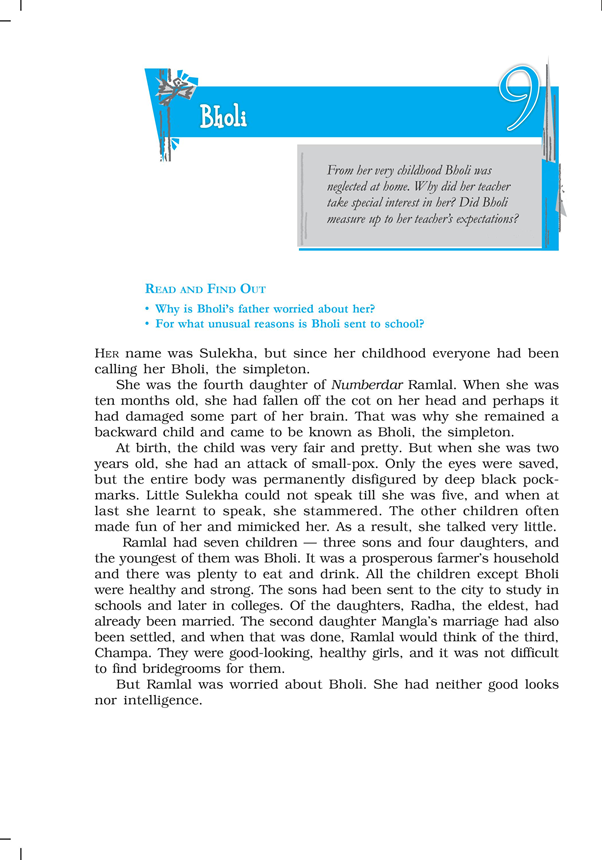
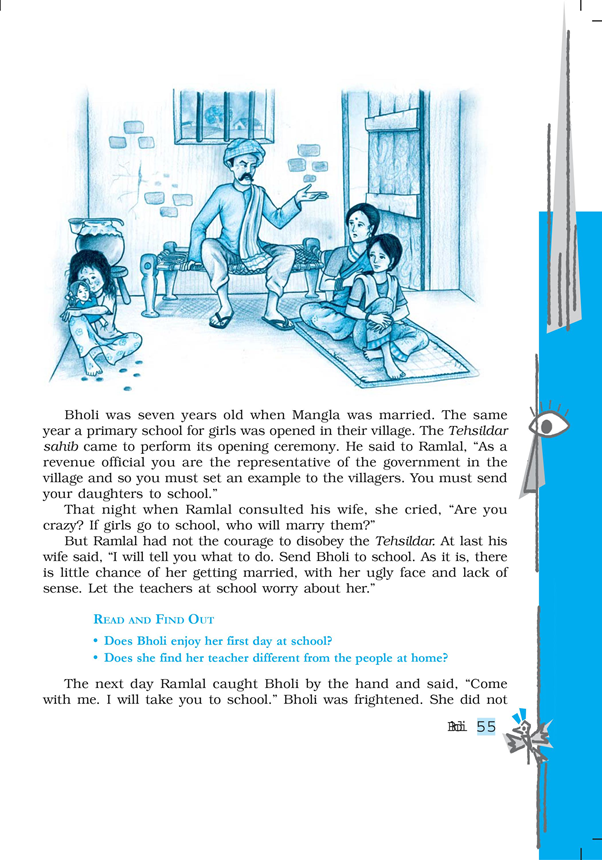
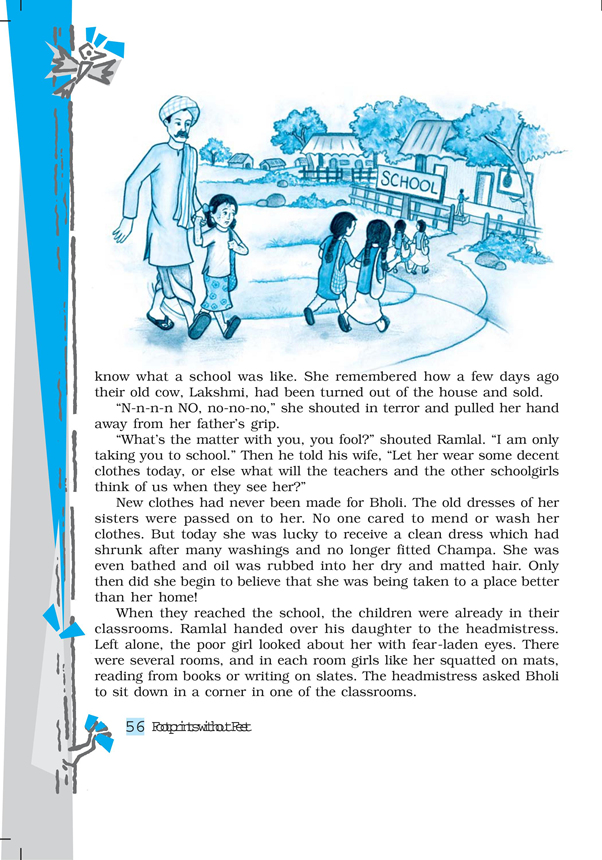
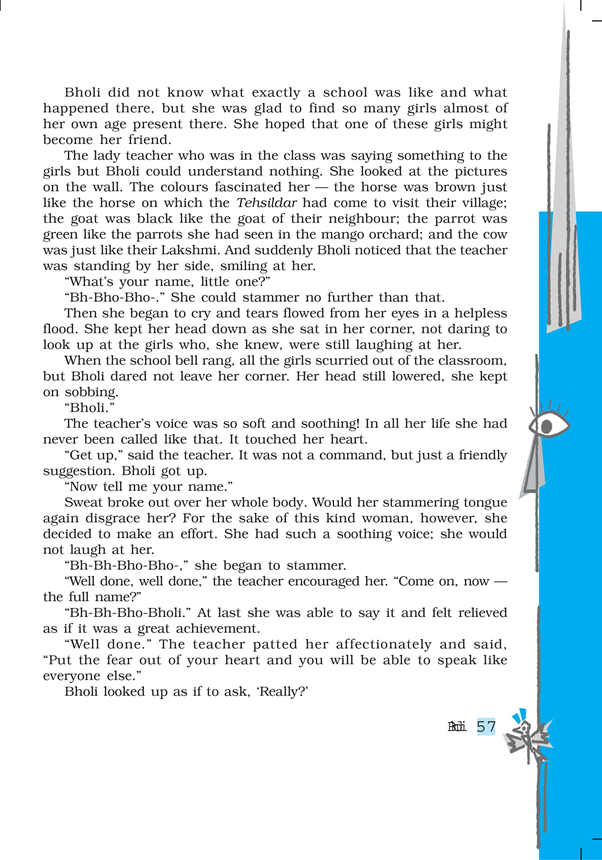
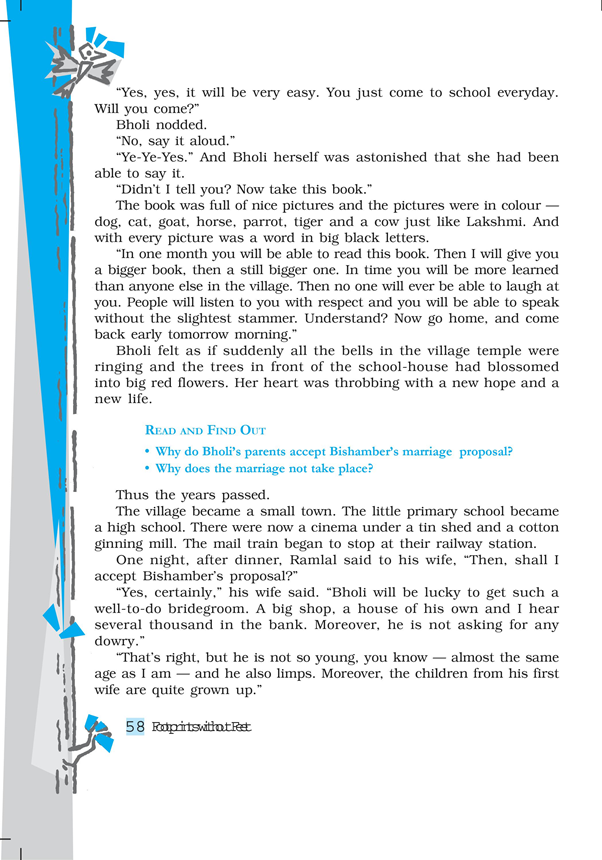
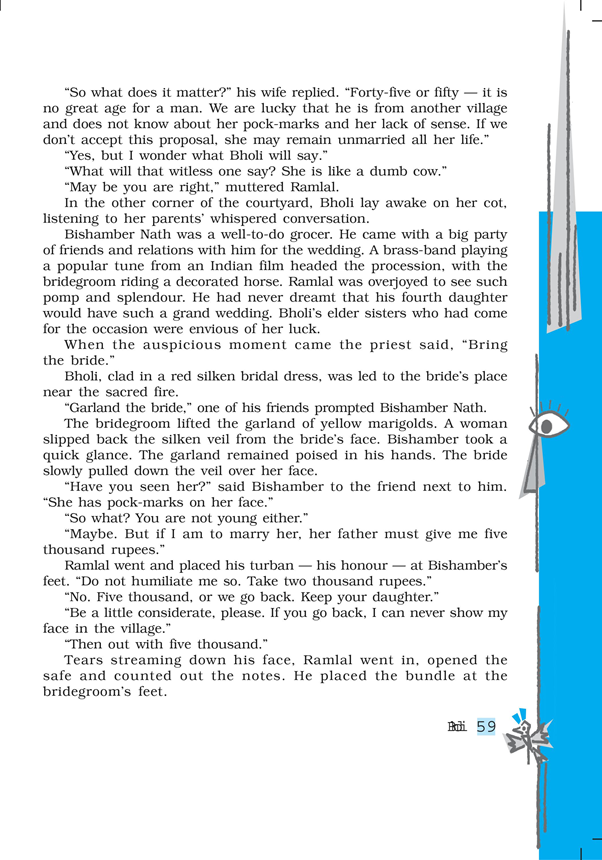
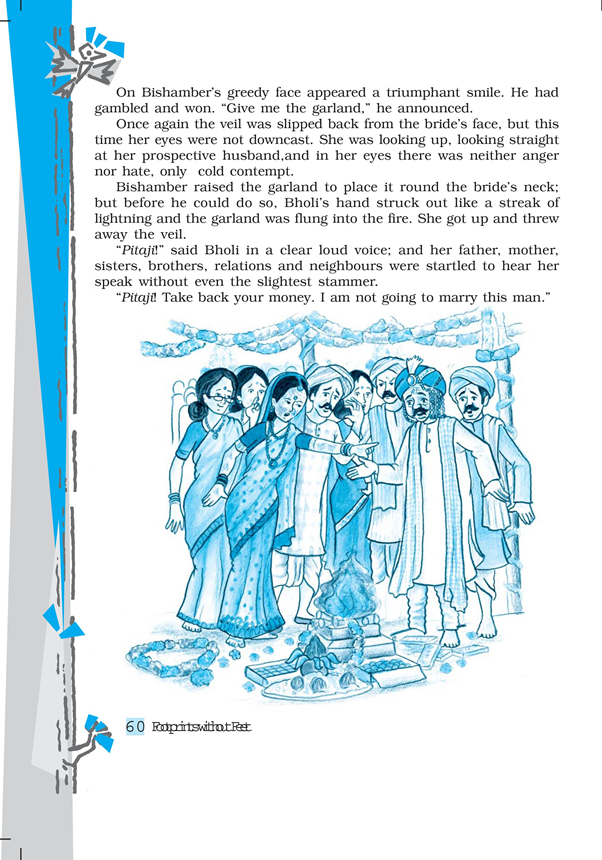
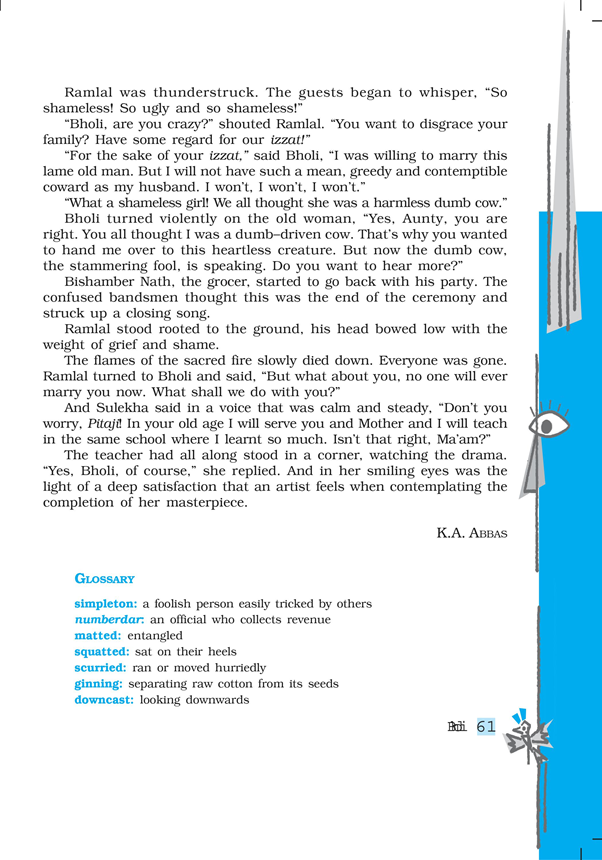
Bholi By KA Abbas
Her name was Sulekha, but since her childhood everyone had been calling her Bholi, the simpleton.
She was the fourth daughter of Numberdar Ramlal. When she was ten months old, she had fallen off the cot on her head and perhaps it had damaged some part of the brain. That was why she remained a backward child and came to be known as Bholi, the simpleton.
At birth, the child was very fair and pretty. But when she was two years old, she had an attack of small pox. Only the eyes were saved, but the entire body was permanently disfigured by deep black pock-marks. Little Sulekha could not speak still she was five, and when at last she learnt to speak, she stammered.The other children often made fun of her and mimicked her. As a result, she talked very little.
Ramlal had seven children- three sons and four daughters, and the youngest of them was Bholi. It was a prosperous farmer’s household and there was plenty to eat and drink. All the children except Bholi were healthy and strong. The sons have been sent to the city to study in schools and later in colleges. Of the daughters, Radha, the eldest had already been married. The second daughter Mangla’s marriage had also been settled, and when that was done, Ramlal would think of the third, Champa. They were good-looking, healthy girls, and it was not difficult to find bridegrooms for them.
But Ramlal was worried about Bholi. She had neither good looks nor intelligence.
Bholi was seven years old when Mangla was married. The same year a primary school for girls was opened in their village. The Tehsildar sahib came to perform its opening ceremony. He said to Ramlal, “As a revenue official you are the representative of the government in the village and so you must set an example to the villagers. You must send your daughter’s to school.”
That night when Ramlal consulted his wife, she cried, “Are you crazy? If girls go to school, who will marry them?”
But Ramlal had not the courage to disable the Tehsildar. At last his wife said, “I will tell you what to do. Send Bholi to school. As it is, there is little chance of her getting married, with the ugly face and lack of sense. Let the teachers at school worry about her.
The next day from Ramlal caught Bholi by the hand and said, “Come with me I will take you to school.” Bholi was frightened. She did not know what a school was like. She remembered how a few days ago their old cow, Lakshmi, had been turned out of the house and sold.
“N-n-n-n-No, no-no-no,” she shouted in terror and pulled her hand away from her father’s grip.
“What’s the matter with you, you fool?” shouted Ramlal. “I am only taking you to school.” Then he told his wife, “Let her wear some decent clothes today, or else what will the teachers and other school girls think of us when they see her?”
New clothes had never been made for Bholi. The old dresses of her sisters were passed on to her. No one cared to mend or wash her clothes. But today she was lucky to receive a clean dress which had shrunk after many washings and no longer fitted Champa. She was even bathed and oil was rubbed into her dry and matted hair. Only then did she begin to believe that she was being taken to a better place than her home!
When they reached the school, the children were already in their classrooms. Ramlal handed over his daughter to the headmistress. Left alone, the poor girl looked about her with fear-laden eyes. There were several rooms, and in each room girls like her squatted on mats, reading from books or writing on slates. The headmistress asked Bholi to sit down in a corner in one of the classrooms.
Bholi did not know what exactly a school was like and what happened there, but she was glad to find so many girls almost of her own age present there. She hoped that one of these girls might become her friend.
The lady teacher who was in the class was saying something to the girls but Bholi could understand nothing. She looked at the pictures on the wall. The colours fascinated her – the horse was brown just like the horse on which the Tehsildar had come to visit their village; the goat was a black like the goat of the neighbour, the parrot was green like the parrots she had seen in the mango orchard; and the cow was just like their Lakshmi. And suddenly Bholi noticed that the teacher was standing by her side, smiling at her.
“What’s your name, little one?”
“Bh-Bho-Bho-” She could stammer no further than that.
Then she began to cry and tears flowed from her eyes in a helpless flood. She kept her head down as she sat in her corner not daring to look up at the girls who, she knew, were still laughing at her.
When the school bell rang, all the girls scurried out of the classroom, but Bholi dared not leave her corner. Her head still lowered, she kept on sobbing.
“Bholi.”
The teacher’s voice was so soft and soothing! In all her life she had never been called like that. It touched her heart.
“Get up.” said the teacher. It was not a command, but just a friendly suggestion. Bholi got up.
“Now tell me your name.”
Sweat broke out over her whole body. Would her stammering tongue again disgrace her? For the sake of this kind woman, however, she decided to make an effort. She had such a soothing voice; she would not laugh at her.
“Bh-Bh-Bho-Bho-,” she began to stammer.
“Well done, well done,” the teacher encouraged her. “Come on, now- the full name?”
“Bh-Bh-Bho-Bholi.” At last she was able to say it and felt relieved as if it was a great achievement.
“Well done.” The teacher patted her affectionately and said,
“Put the fear out of your heart and you will be able to speak like everyone else.”
Bholi looked up as it to ask, ‘Really?’
“Yes, yes, it will be very easy. You just come to school everyday.
Will you come?”
Bholi nodded.
“No, say it aloud.”
“Ye-Ye-Yes.” And Bholi herself was astonished that she had been able to say it.
“Didn’t I tell you? Now take this book.”
The book was full of nice pictures and the pictures were in colour- dog, cat, goat, horse, parrot, tiger and cow just like Lakshmi. And with every picture was a word in big black letters.
“In one month you will be able to read this book. Then I will give you a bigger book, then a still bigger one. In time you will be more learned than anyone else in the village. Then no one will ever be able to laugh at you. People will listen to you with respect and you will be able to speak without the slightest stammer. Understand? Now go home, and come back early tomorrow morning.”
Bholi felt as if suddenly all the bells in the village temple were ringing and the trees in front of the school -house had blossomed into big red flowers. Her heart was throbbing with a new hope and a new life.
Thus the years passed.
The village become a small town. The different primary school became a high school. There were now a cinema under a tin shed and cotton ginning mill. The mail train began to stop at their railway station.
One night, after dinner, Ramlal said to his wife, “Then, shall I accept Bishamber’s proposal?”
“Yes, certainly,” his wife said. “Bholi will be lucky to get such a well-to-do bridegroom. A big shop, a house of his own and I hear several thousand in the bank. Moreover, he is not asking for any dowry.”
“That’s right, but he is not so young, you know- almost the same age as I am- and he also limps. Moreover the children from his first wife are quite grown up.”
“So what does it matter?” his wife replied. “Forty-five or fifty- it is no great age for a man. We are lucky that he is from another village and does not know about her pock-marks and her lack of sense. If we won’t accept this proposal, she may remain unmarried all her life.”
“ Yes but I wonder what Bholi will say.”
“What will that witless one say? She is like a dumb cow.”
“May be you are right,” muttered Ramlal.
In the other corner of the courtyard. Bholi lay awake on her cot, listening to her parents’ whispered conversation.
Bishamber Nath was a well-to-do grocer. He came with a big party of friends and relations with him for the wedding. A brass- band playing a popular tune from an Indian film headed the procession, with the bridegroom riding a decorated horse. Ramlal was overjoyed to see such pomp and splendor. He had never dreamt that his fourth daughter would have such a grand wedding. Bholi’s elder sisters who had come for the occasion were envious of her luck.
When the auspicious moment came the priest said, “ bring the bride.”
Bholi, clad in a red silken bridal dress, was led to the bride’s place near the sacred fire. “Garland the bride,” one of his friends prompted Bishamber Nath. The bridegroom lifted the garland of yellow marigolds. A woman slipped back the silken veil from the bride’s face. Bishamber took a quick glance. The garland remained poised in his hands. The bride slowly pulled down the veil over her face. “Have you seen her?” said Bishamber to the friend next to him. “She has pock-marks on her face.”
“So what? You are not young either.”
“Maybe. But if I am to marry her, her father must give me five thousand rupees.”
Ramlal went and placed his turban — his honour — at Bishamber’s feet. “Do not humiliate me so. Take two thousand rupees.”
“No. Five thousand, or we go back. Keep your daughter.”
“Be a little considerate, please. If you go back, I can never show my face in the village.”
“Then out with five thousand.”
Tears streaming down his face, Ramlal went in, opened the safe and counted out the notes. He placed the bundle at the bridegroom’s feet.
On Bishamber’s greedy face appeared a triumphant smile. He had gambled and won. “Give me the garland,” he announced.
Once again the veil was slipped back from the bride’s face, but this time her eyes were not downcast. She was looking up, looking straight at her prospective husband,and in her eyes there was neither anger nor hate, only cold contempt.
Bishamber raised the garland to place it around the bride’s neck; but before he could do so, Bholi’s hand struck out like a streak of lightening and the garland flung into the fire. She got up and threw away the veil.
“Pitaji!” said Bholi in a clear loud voice; and her father, mother, sisters, brothers, relations and neighbours were startled to hear her speak without even the slightest stammer. “Pitaji! Take back your money. I am not going to marry this man.”
Ramlal was thunderstruck. The guests began to whisper, “So shameless! So ugly and so shameless!”
“Bholi, are you crazy?” shouted Ramlal. “You want to disgrace your family? Have some regard for our izzat!”
“For the sake of your izzat,” said Bholi, “I was willing to marry this lame old man. But I will not have such a mean, greedy and contemptible coward as my husband. I won’t, I won’t, I won’t.”
“What a shameless girl! We all thought she was a harmless dumb cow.”
Bholi turned violently on the old woman, “Yes, Aunty, you are right. You all thought I was a dumb–driven cow. That’s why you wanted to hand me over to this heartless creature. But now the dumb cow, the stammering fool, is speaking. Do you want to hear more?”
Bishamber Nath, the grocer, started to go back with his party. The confused bandsmen thought this was the end of the ceremony and struck up a closing song.
Ramlal stood rooted to the ground, his head bowed low with the weight of grief and shame.
The flames of the sacred fire slowly died down. Everyone was gone. Ramlal turned to Bholi and said, “But what about you, no one will ever marry you now. What shall we do with you?”
And Sulekha said in a voice that was calm and steady, “Don’t you worry, Pitaji! In your old age I will serve you and Mother and I will teach in the same school where I learnt so much. Isn’t that right, Ma’am?”
The teacher had all along stood in a corner, watching the drama. “Yes, Bholi, of course,” she replied. And in her smiling eyes was the light of a deep satisfaction that an artist feels when contemplating the completion of her masterpiece.
Bholi Title Summary
Bholi’s First Few Years
Bholi was one of seven children of Ramlal. Ramlal was a well to do man as he was the Numberdar of the village. There was no lack of comforts in his home but Bholi was still neglected. She fell off her cot when she was just ten months old. Her brain suffered some damage and she was slow in learning things. So, everyone called her Bholi. An attack of small pox at the age of two years left her pock-marked on her entire body. She learned to speak when she was five but she stammered. Everyone made fun of her. Even her parents took her to be just an ugly burden.
Bholi Goes to School
Once the Tehsildar came to inaugurate a new primary school in the village. He asked Ramlal to send his daughters to school. Ramlal could not say no to him. His wife objected that no one would marry the girls if they went to school. But then she felt that Bholi was ugly and it would be difficult to get her married so they decided to send only Bholi to school.
Bholi Prepares for School
Bholi was fearful of going to school at first. Then, she was given new and clean clothes to wear. She was given a bath and her hair was oiled. Now, she felt better. She thought of school as a nice place. All these years no one has taken so much care of her.
Bholi’s First Day at School
Bholi found the classroom full of girls like her. She was afraid and sat in one corner. She was attracted to the colourful pictures on the wall. She was much impressed by the realistic pictures of birds and animals. The teacher asked her name. Bholi stammered and then started crying. After the other children left, the teacher came back to her. She called her lovingly. This time Bholi was able to speak her name better. The teacher encouraged her. She asked her to be fearless. She also told her to come to school everyday. Bholi felt as if a new life was beginning for her.
A Match for Bholi
After a few years, Bholi’s parents got a marriage proposal for her. Ramlal was not very happy. The man was a widower with grown up children. But, his wife was unconcerned. She just felt that as Bholi was so ugly that proposal was good for her. Her father wanted to know how Bholi felt about the proposal but her mother refused to ask Bholi about it.
Bholi Stands up for her Rights
When the wedding was about to take place, Bishamber Nath asked for five thousand rupees to marry Bholii as she had pock-marks. He also threatened to walk away from the ceremony. Ramlal was afraid of the humiliation and so, with tears in his eyes, he handed the dowry money to Bishamber. Bishamber proceeded to garland Bholi but Bholi threw the garland away. She asked her father to take back the money and refused to marry the greedy coward. Everyone went away. Ramlal asked her what would do now. She just told him she would work as a teacher in the same school where she had studied. Her education has changed her outlook.
Chapter Sketch
‘Bholi’ is the story of Sulekha. She is a young girl neglected by all. Education transforms her. It inspires courage and confidence in her. She raises her voice for her rights.
About the Characters
Bholi: Her real name is Sulekha and she is Numberdar (Numberdar- a person in village of high status) Ramlal’s youngest daughter. School education changes her outlook towards life.
Ramlal (Bholi’s father): He is a prosperous father of seven children who has a narrow mindset. For him daughters are born for marriage only.
Bholi’s mother: She is a typical conservative mother. She does not take proper care of Bholi.
Bholi’s school teacher : She educates Bholi and encourages her.
Bishamber : Bholi’s prospective husband who is a greedy man and a dowry seeker.
Chapter Highlights
- Bholi, the fourth daughter of Numberdar Ramlal in a village, was a simple and pock-marked girl. Her real name was Sulekha.
- At ten months, she fell off her cot, damaging her brain and making her a simpleton.
- At two years, she was a victim of small pox which left her pock-marked.
- She learnt to talk in five years, but used to stammer.
- When a primary school was opened in the village, the Tehsildar told Ramlal to send his daughters to school.
- Though Ramlal’s wife felt that sending daughters to school effected their chances of marriage, Bholi’s parents decided to send Bholi to school because they felt she would be difficult to get married anyway as she was ugly.
- Bholi was initially afraid of going to school, but due to the encouragement of her teacher, she continued her studies.
- After a few years the village became a small town and Bholi received an offer of marriage from a widower who was lame but rich. He also did not ask for any dowry.
- At the time of wedding, the bridegroom saw Bholi’s pock-marked face and demanded 5000 rupees as dowry, which Ramlal gave.
- Bholi refused to marry the greedy widower. She later on said that she would take care of her parents and teach in the same school where she got her education.
Word Meanings
pock-marks : marks on the skin left by the small pox disease
mimicked : copy the behaviour or speech of other people
stammered : to speak with many pauses or repetitions because of having speech problem
disfigured : to spoil or damage the appearance of
revenue : the income that a government receives regularly, for an amount representing such income
matted (of hair) : tangled into a thick mass
squatted : sat with knees bent
scurried : to move quickly with short steps
soothing : having a gently calming effect
blossomed ( of a tree or plant) : to produce flowers
throbbing : to beat with a strong, steady rhythm
witless : very foolish or stupid
grocer : one who sells food and household goods
prompted : to cause (someone) to do something
poised : not moving but ready move
humiliate : to make someone feel very ashamed or foolish
streaming : flowing
muttered : to speak quietly so that it is difficult for other people to hear what you say
triumphant : victorious
prospective : likely to be or become something specified in the future
streak : flash
contempt : disregarded for something that should be considered
thunderstruck : extremely surprised or shocked
contemplating : thinking deeply or carefully about something.
Questions and Answers
NCERT Solutions
Read and Find Out
1. Why is Bholi’s father worried about her?
Answer: Bholi was not like other children. She fell off a cot as a child due to which her brain was slightly damaged. She learnt to speak very late and used to stammer. Her face and whole body was covered with pock-marks. Thus, her father was worried about her marriage prospects.
2. For what unusual reason is Bholi sent to school?
Answer: As Ramlal was a government official and the Tehsildar had asked Ramlal to send his daughters to the new school in his village. Bholi was sent to school just to satisfy the Tehsildar. As Ramlal’s wife felt that sending girls to school affected their marriage prospects adversely, she did not want to send any of her daughter’s to school. However, Bholi, with her pock-marked face and her dull brain could not be possible to get married anyway, so Bholi’s parents decided to send her to school to satisfy the Tehsildar.
3. Does Bholi enjoy her first day at school?
Answer: Bholi was afraid at first. She even wept when the teacher asked her name. She just sat in a corner. But the beautiful pictures on the classroom wall attracted her. The gentle, kind and loving manner of her teacher made her comfortable. She was looking forward to her new life by the time the first day ended. Thus, although initially she did not enjoy it, but by the time she went home she had liked school.
4. Does she find her teacher to be different from the people at home?
Answer : Bholi had been a neglected child at home. She was never bathed nor her clothes washed. She was criticized and everyone made fun of her. But, she found her teacher entirely different. Her teacher did not make fun of her ugliness or her stammering. She encouraged her tenderly. Her affection deeply touched Bholi’s heart.
5. Why do Bholi’s parents accept Bishamber’s marriage proposal?
Answer: Bholi’s parents accepted Bishamber’s marriage proposal as he was a well to do grocer and had not asked for any dowry.
6. Why does the marriage not take place?
Answer: At the time of marriage Bishamber asked for a dowry of 5000 rupees because he saw Bholi’s pock-marked face. Ramlal had no choice but to pay. But, Bholi refused to marry the greedy man. She asserted her right and dignity. Thus the marriage party was turned away.
Think About It
1. Bholi had many apprehensions about going to school. What made her feel that she was going to a better place than her home?
Answer: The day she was going to school forced her parents to dress up nicely. She was bathed and her hair was properly done. Until then she was not being taken care of. The special treatment she received make her feel that she is going to a better place.
2. How did Bholi’s teacher play an important role in changing the course of her life?
Answer: Bholi stammered and was just a bundle of nerves when she attended school in the beginning. Her teacher treated her kindly and encouraged to have confidence and be bold. She taught her to read and right and made her an independent girl who was aware of a rights. Thus, she changed her life.
3. Why did Bholi at first agree to an unequal match? Why did she later rejected the marriage? What does this tell about her?
Answer: Bholi agreed to the match at first to fulfill her parents’ wishes.
Later on, she rejected the marriage when the bridegroom asked for dowry. This tells us that Bholii was not a timid and dumb girl. She was aware of her rights. She also knew how to fight for her own dignity and feared no one.
4. Bholi’s real name is Sulekha. We are told this right at the beginning. But only in the last but one paragraph of the story is Bholi called Sulekha again. Why do you think she is called Sulekha at that point in the story?
Answer: The word Bholi means simpleton. Throughout the story she had been a simpleton who hardly expressed her opinion on any matter. The word Sulekha means ‘a person with a beautiful sense of letters’. In this story, this word has a larger meaning of being literate, intelligent and mature individual. After her education, Bholi has really changed to Sulekha and her assertion at the time of her marriage is her announcement to the world that she is no more a Bholi, but is a Sulekha.
Talk About It
1. Bholi’s teacher helped her overcome social barriers by encouraging and motivating her. How do you think you can contribute towards changing the social attitudes illustrated in this story?
Answer: We can contribute by saying no to taking or giving dowry. We must not discriminate between a boy and a girl. Both should be given equal rights and opportunities to grow. We must also learn to respect those who are differently abled and treat them at par.
2. Should girls be aware of the rights and assert them? Should girls and boys have the same rights, duties and privileges? What are some of the ways in which society treats them differently? When we speak of ‘Human rights’ do we differentiate between girl’s rights and boy’s rights?
Answer: Yes, there is a differentiation between girl’s and boy’s rights. Although equal in the eyes of law, society treats them differently. Parents spend more on a boy’s education than that of a girl. A girl is just trained to be a wife and mother.
Boys have special privileges in matters of food, carrier or freedom. Girls must be aware of their rights to exercise them. They must utilise their education to preserve their self-reliance and dignity. They must be ready to demand their due and even fight for it.
3. Do you think the characters in the story were speaking to each other in English? If not, in which language were they speaking? (You can get clues from the names of the persons in the non-English words used in the story.)
Answer: No, we do not think so. They spoke in Hindi. Several words like ‘numberdar, tehsildar sahib, izzat and pitaji’ are ample proof of that. Even the names of the characters like ‘Ramlal’ and ‘Bholi’ support that.
Extra Questions
Extract Based Questions
Read the following extract carefully and choose the correct option.
1. Little Sulekha could not speak till she was five and when at last she learnt to speak, she stammered. The other children often made fun of her and mimicked her.
(i) What did Sulekha later on come to be known as?
(a) Baby
(b) Sweety
(c) Mental
(d) Bholi
(ii) Why did children make fun of her?
(a) because she was poor
(b) because she was innocent
(c) because she stammered while speaking
(d) because she did not complete her homework
(iii) What does the word ‘mimicked’ mean?
(a) to copy the way in which a machine is made
(b) to copy the way in which a particular person usually speaks and moves
(c) to copy the drawings made by others
(d) to copy the written work of others
(iv) What part of speech is ‘often’?
(a) Verb
(b) Adverb
(c) Noun
(d) Pronoun
Answer: (i) (d) Bholi
(ii) (c) because she stammered while speaking
(iii) (b) to copy the way in which a particular person usually speaks and moves
(iv) (b) Adverb
2. She remembered how a few days ago their old cow Lakshmi had been turned out of the house and sold.
“N-n-n-n No, no-no-no,” she shouted in terror and pulled her hand away from her father’s grip.
(i) Why did Bholi shout in terror?
(a) because she thought that her mother was turning her out of her house
(b) because she thought that her teacher was sending her out of the school
(c) because she thought that her father was sending her to school
(d) because she thought that her father was turning her out of his house
(ii) Why did she remember Lakshmi?
(a) Because she missed her a lot
(b) Because she wanted to go with her
(c) Because Lakshmi had also been turned out of the house a year ago
(d) Because Lakshmi had also been turned out of the house a few days ago
(iii) What is the opposite word of ‘forgotten’ in the extract?
(a) Reframed
(b) Recalled
(c) Remembered
(d) Remembers
(iv) The present tense of ‘sold’ is
(a) sells
(b) sell
(c) selling
(d) sale
Answer: (i) (d) Because she thought that her father was turning her out of his house
(ii) (d) Because Lakshmi had also been turned out of the house a few days ago
(iii) (c) Remembered
(iv) (b) sell
3 .The lady teacher who was in class was saying something to the girls but Bholi could understand nothing.
(i) Where was Bholi?
(a) Bholi was in the principal’s room in the village school
(b) Bholi was in her house
(c) Bholi was in the playground
(d) Bholi was in the classroom in the village school
(ii) Why could she understand nothing?
(a) because the teacher was not teaching properly
(b) because it was her second day at school
(c) because it was her first day at school
(d) because the teacher was teaching in English and she did not know English
(iii) What is the opposite word of ‘everything’ in the extract?
(a) something
(b) nothing
(c) anything
(d) none of these
(iv) The opposite of ‘lady teacher’ would be
(a) male teacher
(b) Professor
(c) lady teacher
(d) guest teacher
Answer: (i) (d) Bholi was in the classroom in the village school
(ii) (c) because it was her first day at school
(iii) (b) nothing
(iv) (a) male teacher
4. He said to Ramlal, “As a revenue official you are the representative of the government in the village and so you must set an example to the villagers. You must send your daughters to school.”
(i) Who is ‘he’?
(a) The Tehsildar
(b) Bholi’s brother
(c) Bishamber
(d) Boli’s teacher
(ii) What example does ‘he’ want Ramlal to set?
(a) To send his daughters to school so that other in the village will follow
(b) To send his son’s to school so that others in the village will follow
(c) To send his wife to school
(d) To send his daughters to the opening ceremony of a primary school of girls
(iii) What does the word ‘revenue’ mean?
(a) Income
(b) Expenditure
(c) Tax
(d) Government
(iv) What part of speech is the world ‘an’ in the extract?
(a) Article
(b) Noun
(c) Pronoun
(d) Verb
Answer: (i) (a) The tehsildar
(ii) (a) To send his daughters to school so that others in the village will follow
(iii) (c) Tax
(iv) (a) Article
5. Then she began to cry and tears flowed from her eyes in a helpless flood. She kept her head as she sat in her corner, not daring to look up at the girls, who, she knew were still laughing at her.
(i) Who is ‘she’?
(a) Bholi’s teacher
(b) Bholi’s mother
(c) Sulekha
(d) Bholi’s friend
(ii) Why were the girls laughing at her?
(a) Because she had made mistake
(b) Because she could not solve the sum given by her teacher
(c) Because she did not come in proper uniform
(d) Because she had stammered while seeing her name when asked by the teacher
(iii) What does the word ‘daring’ mean?
(a) Wanting
(b) Showing
(c) Teasing
(d) Seeking
(iv) What is the opposite of ‘laughing’?
(a) Smiling
(b) Crying
(c) Complaining
(d) Teasing
Answer: (i) (c) Sulekha
(ii) (d) Because she had stamina while seeing her name when asked by the teacher
(iii) (a) Wanted
(iv) (b) Crying
Short Questions and Answers
1. Why is Sulekha called Bholi?
Answer: Sulekha is called Bholi because she is a simpleton due to her suffering some brain damage after falling of a cot when she was ten months old. As a result, she is not as smart as children of her age. She is slow in learning things in comparison to others.
2. What happened to Bholi when she was two years old?
Answer: Bholi fell a victim to smallpox at the age of two years. Her face and body became full of pock-marks. She was still fortunate as her eyes have remained untouched and were fine. So her parents took her to be just an ugly burden.
3. How did Bholi react when the teacher asked her name?
Answer: Bholi stammered when she spoke and could not tell her name completely when the teacher asked her to do so. So she broke into tears. But her teacher asked her to be fearless and she spoke better.
4. Bholi was fascinated by the walls of the classroom why?
Answer: The walls of the classroom had bright and colourful pictures of a horse, a goat, a parrot and a cow they all look familiar to Bholi and where like the ones in the village. That is why she was fascinated to see those pictures. She was impressed by the realistic pictures of birds and animals.
5. Bholi found her teacher to be different from others how?
Answer: Others had always neglected Bholi. They made fun of her all the time. But, she found her teacher to be different. Her voice was calm, her manner comforting and touching was full of affection. She always encouraged her to do better than before.
6. What filled Bholi’, a dumb cow, with a new hope in her?
Answer: Bholi’s first day of school brought a hope of a new life. She had found a loving and kind teacher. The teacher has inspired her and given her a book and had made Bholi felt confident about herself and realised that a new life was begging for her.
7. In what way did the village change over time?
Answer: The village changed into a small town over a period of time. The primary school had become a high school. The village had a cinema and a cotton ginning mill. The mail train also stopped at the village railway station.
8. What objections does Ramlal have to Bishamber’s proposal?
Answer: Ramlal was not happy with the proposal. He did not like the fact that Bishamber was of his age. He had a limp (lameness, difficulty in walking) and children were quite grown up. It was not a very satisfactory proportion. But he could not do anything for her as Bholi was not a beautiful girl like others.
9. Why do Bholi’s parents accept Bishamber’s marriage proposal?
Answer: Bholi’s parents accepted Bishamber’s marriage proposal because they were happy that he was well off and had not asked for dowry. And they also realised that because of her looks, he would be the perfect match.
10. Why were Bholi’s sisters envious about her luck?
Answer: Bishamber Nath was.quite prosperous. The procession of Bholi’s marriage had a brass band and the groom rode decorated horse. Such pomp and show impressed everyone. All this made her sisters envious of her.
11. Why did Bishamber’s marriage with Bholi not take place?
Answer: Bishamber’s marriage with Bholi did not take place because he had demanded a dowry of five thousand rupees from her father for the marriage. So, Bholi refused to marry him and called him a greedy coward.
12. Why was Ramlal thunderstruck?
Answer: Ramlal had always taken his daughters to be dumb. He was thunderstruck when she loudly ask him to take back the money and declared that she was not going to marry Bishamber because of his greed. The incident also made him realised the value of education for girls.
13. The last line of the text talks about an artist and the masterpiece. Elaborate.
Answer: The artist is the teacher and the masterpiece is Bholi. It was her teacher who had turned Bholi into a strong and independent girl who was aware of a place in society. As an artist can make a masterpiece if he find the perfect material.
14. What kind of mother was Ramlal’s wife?
Answer: Ramlal’s wife was a traditional housewife who believed that daughter should not be educated, as it would be difficult to find husbands for them. She neglected looking after her daughter Bholi because she was a slow learner.
Long Questions and Answers
1. Dowry is negation of the girl’s dignity. Discuss with reference to the story ‘Bholi’.
Answer: A girl is an individual in her own right. Equal opportunities in life can help her become independent and strong. She is not a burdensome object to be given away with money as compensation. Thus dowry negares the girl’s dignity and self respect.
The story ‘Bholi’ shows this in a dramatic manner. Bholi is thought to be ugly and dumb by her parents. So, they are willing to pay dowry to an old man with a limp. So that he marries her. Bholi, on the other hand refuses to marry that man. She is educated, assertive and capable of taking care of herself. She dedicates her life to service of her parents and teaching at school.
So, in the same manner, a girl should behave when the situation is not praiseworthy or causes trouble to the society and girls. Nowadays girls are empowering their thoughts and freedom of speech because of education and equal rights in the society. A society evil like dowry is not acceptable at any cost as it affects the dignity of a girl. And girls have all the rights to say ‘no’ to the person who demands it to prove his masculinity.
2. Bholi chose a dignified life of service rather than surrendering herself to a greedy old man for the rest of her life. Education provides the required stimulus to overcome one’s personal barriers. Explain the role of education in shaping the life of a child with respect to the lesson ‘Bholi’.
or
School education turned Bholi from a dumb cow into a bold girl. How did she save her father from a huge expense and become his support in his old age?
Answer: Gone are the days when girl’s education was considered as an unacceptable right as they were not allowed to come out of their houses. But education is the answer to all social ills. Illiteracy and ignorance bring nothing but poverty, suffering and misery. Bholi lacks confidence initially because of her disabilities. She is silent, timid and weak in mind. Her ugliness and her stammer do not let her progress. She is afraid to speak as others make fun of her.
School changes her life completely to open a new world of hope for her. Her teacher treats her with love and kindness. Her affection and support help Bholi to have faith in herself.
She studies and grows into a confident young women. She knows her rights and she asserts them as well. She refuses to marry a man who demands dowry. Thus, being educated changes the life of Bholi.
Here, Bholi represents all the girls of society who take stand for their rights and know what is right or what is wrong. This happens only due to proper education to girls. If a girl is educated, she can change the society and nation.
She is like the base of the family and imparts her knowledge and experience to her family and next generation. So education is the right and must for the girls.
3. “Put the fear out of your heart and you will be able to speak like anyone else.” These words of encouragement from the teacher highlight that change of social attitude and encouragement can help a child like Bholi to become confident and face the world bravely. Taking help from the lesson ‘Bholi’ write how the social attitude towards Bholi made her and introvert. What should be done to help the children to face the world bravely?
Answer: Bholi suffered a week mind due to her accident (falling from her cot) during her infancy. She also started to stammer while speaking. Then she became ugly due to pock-marks on her face and body on contracting the smallpox disease. All these made her family and other children treat her badly, resulting in her becoming an introvert. To help such children face the world bravely, we must treat them with love and affection and encourage them to join mainstream society. We must not mock their disabilities instead; we should give them hope that they can be as good as the other children by motivating uplifting them.
As we know that every child is special and proper guidance and support can boost up the morals and encourage them to do good in their lives. There are a lot of children like Bholi in our society who need utmost care and affection from us. And we can help them to improve their lives to excel in their future.
Top of Form
Bottom of Form



